Editorial
Towards collective suicide?

Monday 31st October, 2022
Some dissident SLPP MPs have warned that the government will fail to secure the passage of the upcoming budget and collapse as a result if the latter seeks to bulldoze its way through without heeding the views of the Opposition and the interests of the public. The SLPP-UNP administration has only a wafer-thin majority in Parliament, and therefore it is likely to fail to muster enough votes for the ratification of Budget 2023, the SLPP rebels have said. This could be considered a veiled threat rather than a warning. Has the anti-Basil faction of the SLPP let the cat out of the bag?
If a finance Bill is defeated, the government will have to resign. But this option is best left uncontemplated, for it will amount to collective suicide. The need for dislodging the incumbent dispensation cannot be overstated. Its leaders have not mended their ways; they are doing more of what they did prior to the mass uprisings that caused the ouster of President Gotabaya Rajapaksa. Corruption is rampant, and ministers continue to cut shady deals and line their pockets. What they are doing to the country is like stripping a disaster victim of his or her valuables. A clean break with the current misrule is a prerequisite for a course correction to restore political and social order and bring about economic stability. But the defeat of Budget 2023 will plunge the country into utter chaos, which might even cost it the much-needed IMF assistance. Hence the need for all political parties represented in Parliament to desist from engaging in political battles over the national budget, adopt a consensual approach and ensure its smooth passage, thus sending a clear message to the rest of the world that Sri Lanka is serious about resolving its economic crisis and paying back its loans.
Both the government and the Opposition must act responsibly. The former must take on board the views of the Opposition and other stakeholders on Budget 2023; similarly, the latter had better act with restraint without trying to torpedo the budget to compass its political ends at the expense of the country. Both warring parties ought to have extensive discussions on the budget, make compromises and reach middle ground so that it will not be a casualty of their political battles.
The government has to come to terms with the fact that it is now like Miracle Mike, the chicken that lived 18 months after being beheaded, in the US, about seven decades ago. Its end is only a matter of time despite its leaders’ rodomontade. Speculation is rife that it is about to suffer another split soon with some of its MPs joining the UNP.
There is a school of thought that thinks the SLPP MPs who have chosen to remain in the government will vote for the budget en bloc because the collapse of the government as well as an early general election is a worrisome proposition for them. But governments have fallen due to mass crossovers in this country. Most of those who defected from the Chandrika Bandaranaike Kumaratunga government in 2001, causing its collapse, are in the current Parliament; S. B. Dissanayake, who was the General Secretary of the SLFP, together with more than a dozen other People’s Alliance MPs crossed over to the UNP!
Attempts to scuttle budgets in Parliament are not of recent origin. In 2007, when Ranil Wickremesinghe was the Opposition Leader, the UNP-led Opposition tried to defeat Budget 2008 in a bid to bring down the Mahinda Rajapaksa government at the height of war. It failed in its endeavour. Dullas Alahapperuma, who was a minister at the time, disclosed at a media briefing subsequently that some government MPs had been bribed to vote against the budget, as part of a conspiracy to derail the war; they had been found in posh hotels in the company of foreign prostitutes, he said, claiming that the government had fought quite a battle to prevent those corrupt, randy elements from doing what they had taken bribes for. The government managed to win the budget vote. Alahapperuma stopped short of revealing how it had frustrated the Opposition’s efforts, but there is reason to believe that the Rajapaksas outbribed their opponents, as we argued in a previous comment.
If the UNP, the JVP, the TNA, etc., had succeeded in shooting down the national budget in 2007, the war would not have been over in 2009, and people would have continued to live in fear of bombs and massacres. If the incumbent government fails to have Budget 2023 ratified, the economic crisis will take a turn for the worse, aggravating people’s suffering. One can only hope that sanity will prevail and the government as well as the Opposition will act wisely. Nothing must be done that will further weaken the ailing economy.
Editorial
Euphoria, realpolitik and reality

Thursday 7th November, 2024
The NPP’s victory in the September presidential election has catapulted the JVP to the limelight. An otherwise camera-shy JVP General Secretary, Tilvin Silva, faced an interview on the state-owned ITN on Tuesday night. What he came out with was usual campaign rhetoric, but there were some takeaways.
Silva said the JVP-led NPP had succeeded in exposing its opponents’ propaganda lies. The SLPP, the UNP, the SJB, etc., had predicted a collapse of the economy and Sri Lanka’s international isolation in the event of an NPP win in the presidential contest, but the economy was doing well; the IMF programme was on track, and some powerful nations had assured President Anura Kumara Dissanayake’ interim government of assistance, he said. China was so pleased with the JVP-NPP government’s commitment to good governance that it had decided to donate school uniform fabric to all students, he claimed.
China has no doubt helped this country in numerous ways. But wasn’t the JVP among the political parties that faulted China of having granted loans for the Rajapaksas’ mega infrastructural projects riddled with corruption?
Silva also said the US, impressed by the JVP-NPP government’s anti-corruption campaign, had offered to help attract American investors. Whoever would have thought, a few years ago, that the JVP would ever consider it an achievement to be in the good books of the US? And, why has the US done a volte-face on its better-dead-than-red policy to help the NPP led by the Marxist JVP?
The JVP, or any other party for that matter, would do well to be wary of the envoys of powerful nations bearing gifts. The big powers have neither aversion to corruption nor any love for democracy and good governance. They back foreign governments which, in their estimation, can be used to further their geo-strategic interests regardless of whether the latter are corrupt. The US had no qualms about defending Marcos of the Philippines, Shah of Iran, Papa Doc and Baby Doc of Haiti and countless other corrupt dictators across the globe to promote its own interests.
Moreover, the Americans have re-elected Donald Trump as their 47th President despite multiple court cases—both civil and criminal—against him, and his felony conviction with sentencing due soon.
The JVP/NPP should be cautious instead of being euphoric when the US showers praise on its government and offers help. It is popularly said that gift horses should not be looked in the mouth, but they must be looked in the belly. If the Trojans had been wise enough to do so during their legendary war with the Greeks, Troy would have been safe. It will be prudent for the JVP/NPP leaders to figure out what the US expects in return for its support. Altruism is no driver of foreign relations in the modern world.
President Gotabaya Rajapaksa refused to sign a Status of Forces Agreement which, if inked, would have allowed US troops to be stationed in Sri Lanka. During the 2022 uprising here, the US cranked up pressure on Gotabaya not to use force against the protesters who were all out to oust him. However, it looked the other way, when his successor, Ranil Wickremesinghe, had the Galle Face protest or Aragalaya crushed. In March 2024, the then Speaker Mahinda Yapa Abeywardena revealed in Parliament that some foreign powers had pressured him to take over the executive presidency and form a government in violation of the Constitution after the resignation of President Rajapaksa. Former Bangladeshi Prime Minister Sheikh Hasina has reportedly alleged that Washington played a role in her ouster because she refused to cede control of St. Martin’s island to the US.
Perhaps, it was India that helped further the NPP’s political interests more than any other country. A lot of legitimacy accrued to the JVP/NPP from Dissanayake’s India visit, so much so that the JVP denied ever having conducted a lecture on Indian expansionism as part of its initiation programme in the late 1980s. Diplomacy is never devoid of realpolitik, and the true nature of India’s relations with the JVP/NPP will be known only when the latter reveals its position on key issues concerning the 13th Amendment, the plunder by Indian fishers of Sri Lanka’s fishing resources, and Adani Group’s proposed power projects here.
Silva said in the aforesaid interview that during the Gotabaya Rajapaksa government, the then Minister Nimal Siripala de Silva had been compelled to resign from the Cabinet following a complaint by a Japanese envoy that he had sought kickbacks from a Japanese company engaged in a BIA expansion project, but President Ranil Wickremesinghe had reappointed him. This is a very serious allegation, which has not been probed properly though it has been repeated umpteen times. Will the JVP-NPP order a fresh probe into it?
Editorial
CPC skirts main issue

Wednesday 6th November, 2024
The Ceylon Petroleum Corporation (CPC) has leapt to the defence of the JVP/NPP government, which is under fire for the latest fuel price revision. Only the prices of Octane 95 petrol and Super Diesel have been reduced much to the resentment of the ordinary people who use Octane 92 petrol and Auto Diesel.
CPC Chairman D. A. Rajakarauna has told the media that the CPC is no longer free to determine petroleum prices due to the presence of some foreign companies in the fuel retail market, where the current fuel pricing formula applies to all players alike mandatorily. The agreements Sri Lanka signed with those foreign firms under the previous dispensation have restricted the CPC’s independence; otherwise, the CPC would have been able to lower the prices of other fuel types as well, Rajakaruna has claimed.
The CPC Chairman’s argument smacks of a misrepresentation of facts about the impact of the aforesaid agreements; it is also self-defeating. His line of reasoning makes one wonder whether the JVP/NPP, which used to make ex cathedra assertions about fuel prices, which it promised to slash, was not aware of the agreements in question when it was in the Opposition. It claims to have a team of mavens, doesn’t it?
The CPC management has apparently sought to obfuscate the main issue and deflect the blame for the government’s failure to reduce fuel prices. It has chosen to leave something important unsaid about the fuel prices and the agreements under discussion; the foreign companies involved in fuel retailing will incur losses only in a situation where fuel prices are arbitrarily reduced while the petroleum taxes are kept at the existing level, the way governments did in the past for political reasons. The costs of all fuel types include government taxes. The NPP pledged to lower fuel prices by reducing petroleum taxes, didn’t it? If it had decreased the taxes, fuel prices could have been brought down through the pricing formula, and the foreign companies would not have suffered any losses.
The Opposition insists that taxes on a litre of Octane 92 petrol amount more than Rs. 150. Will the CPC panjandrums give cost breakdowns for all fuel types so that the public will know how much they pay by way of petroleum taxes? They should also publicise the controversial agreements.
There is no gainsaying that the current government or a future administration, for that matter, must not resort to anything that will stand in the way of the ongoing efforts to boost state revenue significantly. The JVP/NPP should have known better than to promise huge fuel price reductions. Some of the main causes of the current economic crisis were politically motivated tax and tariff reductions under the Gotabaya Rajapaksa government. The ongoing economic recovery programme would go pear-shaped if some of the NPP’s main election promises were implemented.
The government’s failure to carry out its pledge to reduce fuel prices substantially entails a considerable political cost, which the JVP/NPP needs like a hole in the head at this juncture. But there is hardly anything the government can do about it. The IMF has set revenue targets for Sri Lanka, and unless they are met, the next tranche of the extended fund facility will not be unlocked. Hence the need for all political parties to refrain from promising what they cannot deliver.
The NPP is not alone in having made promises that cannot be fulfilled. One wonders whether those who made them were really serious about honouring them. The SJB has also promised to renegotiate the IMF programme!
The energy sector agreements the CPC Chairman has reportedly frowned upon bolster arguments against involving foreign companies in large-scale power generation projects here. The entry of conglomerates such as Adani into the local power sector could lead to a situation where they will pursue profit maximisation ruthlessly, causing Sri Lanka to run the risk of facing the same fate as Bangladesh, which is now at the mercy of Adani Power. It will be interesting to see how the NPP and its rivals propose to tackle this issue, which is bound to affect Sri Lanka’s energy sovereignty?
Editorial
Polluted TUs
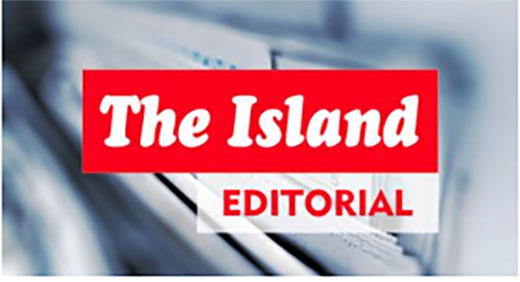
Political propaganda is double-edged. Hence the need to handle it carefully lest it should backfire. One may recall that before the 2019 presidential election, a prominent Buddhist monk blundered by asking SLPP candidate Gotabaya Rajapaksa to act like Hitler. The then Opposition made Gotabaya out to be Hitler incarnate thereafter. JVP/NPP stalwart Lal Kantha, addressing a campaign rally in the run-up to the September presidential election, pledged to vest villagers with some judicial powers. The opponents of the JVP/NPP raised hell, claiming that the JVP was planning to reintroduce kangaroo trials. President Anura Kumara Dissanayake has drawn heavy flak for asking the people to get rid of the Opposition and elect 225 NPP MPs in the upcoming general election. Besides, in a bid to discredit the government, the Opposition is now using a rhetorical statement made by Lakshman Nipuna Arachchi, an NPP candidate in the current parliamentary election fray, about trade unions. Addressing an election rally, Nipuna Arachchi said the other day that trade unions had become redundant as the NPP government was now looking after the interests of the working class; there was no need for labour struggles, and the NPP should consider disbanding the trade unions affiliated to it.
The Opposition parties have given a twist to Nipuna Arachchi’s statement to suit their own narratives and agendas. Some of them have claimed the NPP has issued a not-so-veiled threat to Sri Lanka’s trade union movement.
Nipuna Arachchi’s statement boils down to mere campaign rhetoric. Those who are out of power usually see more devils than vast hell can hold and cry wolf at the drop of a hat. That is the name of the game in Sri Lankan politics.
The JVP-led NPP has however brought to light, albeit unwittingly, an important issue that has gone unaddressed all these years—the over-politicisation of trade unions, which have been reduced to mere appendages of political parties as a result.
Political spectacles that pass for May Day rallies in this country are cringeworthy. Workers carry politicians on their shoulders, making a public display of their servility. In fact, May Day rallies have become political dog-and-pony shows.
Trade unions with political agendas do not hesitate to subjugate the interests of workers and the country to their parties’ agendas. There are a handful of independent unions, but they are the exception that proves the rule. Thus, one may argue that the JVP/NPP should seriously consider disbanding its trade union wing forthwith, as Nipuna Arachchi has suggested. Other political parties with trade union arms ought to follow suit.
Much is being spoken these days about the need to bring about a new political culture. There is also a need for a new trade union culture, which is a prerequisite for serving the interests of workers and achieving economic development. Sri Lanka lacks a work ethic, without which national productivity cannot be increased to achieve economic progress. Most trade unions only make demands and never do they concentrate on their members’ duties and responsibilities. They are also responsible for having rendered the state sector inefficient and unproductive. A stock of biometric attendance marking devices procured by the Health Ministry at a cost of Rs. 30 million remains unused due to trade union resistance, we are told. The health sector has therefore become notorious for overtime rackets. This is how trade union power is abused. Most labour unions in the private sector are no better.
Sri Lankan trade unions ought to learn from their counterparts in other countries, such as Japan, how to act responsibly and help the country achieve progress while protecting labour rights. That said, the blame for the sorry state of affairs in this country should be apportioned to successive governments and most private sector employers. The only way workers can have themselves heard and their grievances redressed, in most cases, is to protest or down tools, and the trade union arms of political parties make the most of this situation.
Sri Lanka has set for itself ambitious economic goals and debt repayment targets. None of them may be attainable unless national productivity is enhanced substantially with employees, employers, trade unions and politicians putting their shoulders to the wheel. This task requires healthy relations and cooperation among key stakeholders. Hence the pressing need for a radical rethink of trade unionism in this country.
-

 Business6 days ago
Business6 days agoStandard Chartered appoints Harini Jayaweera as Chief Compliance Officer
-
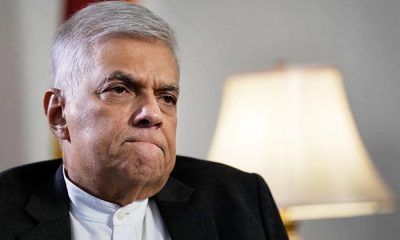
 News7 days ago
News7 days agoWickremesinghe defends former presidents’ privileges
-
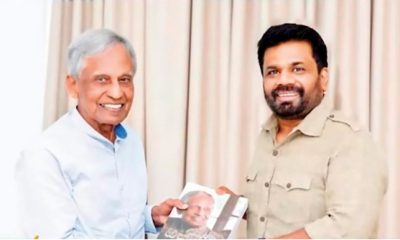
 Opinion7 days ago
Opinion7 days agoDevolution and Comrade Anura
-

 News5 days ago
News5 days agoFifteen heads of Sri Lanka missions overseas urgently recalled
-

 News5 days ago
News5 days agoFive-star hotels stop serving pork products
-
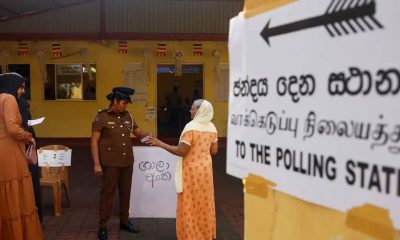
 Features5 days ago
Features5 days agoWaiting for a Democratic Opposition
-
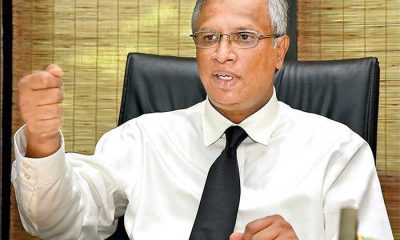
 News4 days ago
News4 days agoITAK denies secret pact with NPP
-

 Sports7 days ago
Sports7 days agoChamika, Anuka shine as Mahanama beat Nalanda











